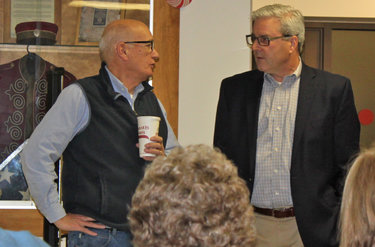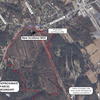Conway resigns as Voorheesville mayor, Straut named successor
VOORHEESVILLE — After 15 years, Robert Conway’s last day as Voorheesville’s mayor is July 1.
Elected four times as mayor, Conway announced at the June 22 village board meeting that he would resign with about nine months left in his term. The village board then voted, 3 to 0, that Trustee Richard Straut would fill out the remainder of Conway’s four-year term.
Straut said he was “honored” that his fellow board members had confidence in him “to take the reins.”
For his part, Conway said he’s got “absolutely no qualms” about Straut taking over for him as mayor, adding that Straut has shown himself to be a very capable and talented board member. Conway said he is sure Straut will do an “exceptional job” as mayor.
Straut was appointed to the board of trustees in 2016, after Brett Hotaling resigned to become the village’s superintendent of public works; in 2017, Straut was unopposed in an election to fill out the remainder of Hotaling’s four-year term.
Straut was re-elected to his own four-year term in 2019.
Mayor Straut
Straut, an engineer, has been the village’s go-to trustee when it comes to handling all things infrastructure, dealing with sewer issues in Salem Hills, spearheading a $3.6-million Main Street sewer project, and acting as a conduit on hundreds-of-thousands of dollars spent on sidewalks in the village.
Asked if infrastructure would stay in his portfolio as mayor, Straut said he thinks he’ll continue to be very active with the village’s infrastructure projects in part because “it’s something that’s in my wheelhouse, just because of my professional career.”
But he added, “In implementing projects, I really am looking for some folks to continue to help.”
As for his replacement, Straut said he’d like to bring in someone with fresh ideas before cutting to the heart of it: “I’d like to bring in some youth.”
“And I’m not making a statement about the board that they haven't made about themselves,” Straut said. “But I think we all agree that we’d like to bring in some younger blood, some fresh ideas.” Straut is in his 50s; the other three trustees are in their 70s.
Straut, along with Sarita Winchell, was re-elected to a full term in 2019; both trustees, like the mayor when he was a trustee, were appointed to the board, after their predecessors stepped down in the middle of their terms. Winchell’s predecessor, Florence Reddy, had been appointed to the board, as had Straut’s predecessor, Hotaling.
Straut was asked about this Voorheesville trend: Shouldn’t elected officials stick it out until the end of their term and then walk away?
But Straut said he thought the resignations and subsequent appointments had just been “matter[s] of timing.”
Conway had been on the job for some 15 years and he and his wife had wanted to do some traveling, Straut said, a point made by the outgoing mayor himself.
Straut’s appointment as trustee had been made because Hotaling was named the village’s superintendent of public works.
And Winchell’s appointment, he said, “I think that resignation was somebody who just said, ‘This isn’t for me at this point in my life, to be a trustee.’”
Straut said, “So I think it’s just a matter of timing. It’s not anything other than that.”
He also pointed out that no one has stepped up to run against incumbents when there is an election.
“I don’t say that’s good or bad, either way,” he said. “I guess what I think that means is that people are generally satisfied.”
Straut said something similar in 2019 when asked why he thought no one ever ran for the board: “You know, I ask myself that all the time … I think people must be content — I like to say happy — but at least content with how things are going. We are fiscally conservative; so our village taxes are low. And we provide good services.”
Non-partisan succession planning
Straut emphasized that, in a time of extreme partisanship, by definition what he and the other trustees do is political in that they are elected, however village elections are non-partisan.
“I think sometimes people shy away from what they think is politics,” Straut said, but at the village-level, it’s just about the least political position in politics a person could be in.
“We’re talking about: How do we fix and improve our water and sewer systems without breaking the bank?” he said. “How do we get Main Street revitalized again without breaking the bank?”
Straut doesn’t see what he does as politics. “I look at it as community service,” he said. “And I think that’s how most of the board members look at it as well.”
He encouraged residents to get involved in the village, because currently the board is looking for people to serve on the planning commission, zoning board of appeals, and the conservation advisory commission — which is also something that he sees as a major issue facing the village over the next four to eight to 12 years: “I see succession planning being one of the things that I need to look at.”
Straut said he wants to recruit residents not only for the previously mentioned boards but also for the board of trustees. “We need to recruit people for the boards that I talked about and make sure that we have good, fresh ideas,” he said.
Mayor for 15 years
Like many people over the past 15 months, Conway said he and his wife, Linda, had been forced to put things on hold and “maybe reassess a little bit.”
He and his wife have plans to travel, plans which were put off by the pandemic, Conway said, and now with everything opening up, he’d be out of the village for months at a time, which is “not fair to the residents, certainly.”
“I mean, they deserve to have somebody devoting their energies to being there,” he said, and it’s just time. Conway noted he had been mayor for 15 years, adding, “The village needs somebody that’s fully engaged.”
Conway was appointed trustee in 2002, a position he took because had expertise he could bring to the board and wanted to participate in government, he said, and “I thought it was a good opportunity to put some of my skill sets to work.”
Conway had been the Albany County Director of Human Resources until 2012, when he was jettisoned from the position by the then-new county executive, Daniel McCoy. Conway had worked for the county for nearly 25 years, and had held the appointed director’s job for the last 11, under the previous county executive, Michael Breslin.
Now Conway said he is about “three-quarters of the way out the door” toward retiring but he’s still selling real estate.
On running for mayor in 2006, Conway said, after having served as a trustee for close to four years, there were some projects he wanted to continue shepherding along as well as other things he wanted to accomplish.
He said it was “mostly involved with infrastructure, and pretty much what we’ve continued to do over the last 15 years: upgrade to the sewer plant and the water plant, the water systems, the pipes — I mean, nothing real sexy and nothing a lot of people necessarily know.” But they were the types of projects necessary to keep the village moving forward.
Yes, there were the visible projects like sidewalks and what the village added to the rail trail, Conway said, “but really, the nuts and bolts of running a village are the things that you need to keep going, that people don’t notice until it’s not there.”
Asked about the issues he sees the village facing over the next five to 10 to 15 years, Conway said, “I think it’s going to be the pressures that have always been there”: Trying to maintain the character of the village while still delivering the services residents have come to expect while also remaining one of the lowest-taxed municipalities in the area.
He said that Voorheesville has survived previous drastic and stressful economic times, pointing to the 2007-09 Great Recession, when the real-estate market collapsed, and then to the past 15 months with the pandemic.
“So we’ve always been very conscious of that and kept a real conservative eye on finances,” he said.
And the village is also looking to revitalize and “develop a little bit more” Main Street, Conway said, and hopes to bring in some more small businesses.
Asked about his greatest success or achievement in his time as mayor, Conway pointed to the board’s ability to maintain Voorheesville’s semi-rural and village character, “while still doing the things necessary to keep us modernized, in a way.”
For example, Conway said, the village was able to extend its sidewalk network and upgrade some of its infrastructure.
Asked if there was anything he would have done differently, Conway said, “You always wonder if something could be done better.” But Conway then said he’d like to have seen the Quiet Zone — to quell the horns of trains passing through the village — completed during his term as mayor.
“Other than that,” said Conway, who had drawn the ire of the old Voorheesville Area Ambulance Service and faced public backlash over the handling of a development Saint Matthew’s Church, “I can’t think of anything that I thought was totally the wrong way to go. I don’t have any regrets in that sense, that comes to mind anyway.”


